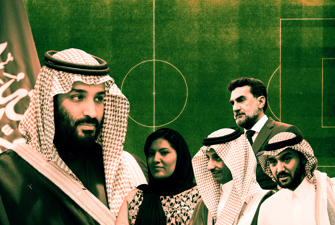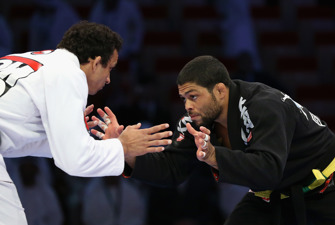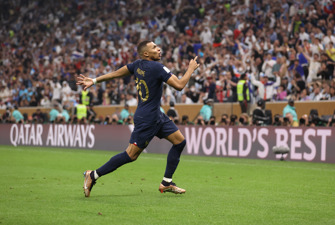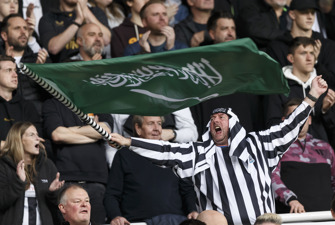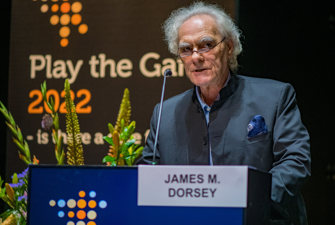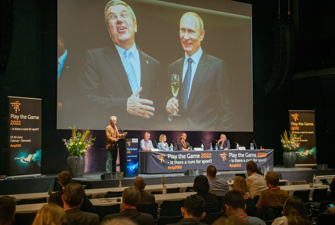The expansion of Saudi investments in sport: From football to esport
In this article, senior analyst Stanis Elsborg maps and outlines the extent of Saudi Arabia’s investment and engagement in the world of sport. He demonstrates how central sport has become as a political instrument for the leaders of Saudi Arabia.
Reactions were mixed when a group led by Saudi Arabia’s Public Investment Fund (PIF) in October 2021 completed the purchase of Premier League football club Newcastle United. In some places, fans were celebrating in the streets, and in other places human rights groups tried to highlight that Saudi Arabia is responsible for several serious human rights violations, stressing the close ties between the Saudi Arabian regime and the Saudi-led consortium where PIF is the majority owner: The chairman of PIF is the Crown Prince of Saudi Arabia and newly elected prime minister, Mohammed bin Salman.
Saudi Arabia’s engagement in sports is currently one of the hottest topics in the international sports debate particularly since the Kingdom’s takeover of Newcastle United, the announcement of the breakaway golf tournament LIV Golf Invitational Series in early 2022, and Cristiano Ronaldo’s new contract with the Saudi Arabian football club Al Nassr.
These cases and the general interest from Saudi Arabia in sport is often referred to as sportswashing and an attempt to use sport to launder the country's image. However, for the rulers of Saudi Arabia, sport is not just used to launder or whitewash their global reputation and cover up their abysmal human rights record. It is a key part of their national development strategy ‘Vision 2030’, and a vehicle in international relations to gain political goodwill, create diplomatic relations, and investments.
This article looks at the extent of Saudi Arabia’s investments and engagement in international sport as well as their many sponsorships, club ownerships and hosting of sporting events in everything from football and motorsport to golf, wrestling, handball, and the burgeoning scene of esports. All of it made possible by the royal family’s and the regime’s fortunes, its sovereign wealth fund, and state-owned companies.
The Saudi government’s commitment to football
The acquisition of Newcastle United has become a very visible symbol of Saudi Arabia’s investments in sport but it was far from a new thing, not even in football. Many football historians and enthusiasts will remember the King Fahd Cup, launched in the mid-1990s, and named after the then Saudi ruler Fahd bin Abdulaziz Al Saud. The kingdom initially paid all the expenses of participating nations and successfully brought six continental champions to Saudi Arabia’s capital of Riyadh for the first three editions of the tournament. In 1997 FIFA completed its takeover of the tournament and changed the name to FIFA Confederations Cup.
Fans celebrating during the FIFA Confederation Cup match between Brazil and Saudi Arabia in 1997 at the King Fahd Stadium in Riyadh, Saudi Arabia. Photo: Allsport UK / Allsport / Getty Images
While it would take a decade for Saudi Arabia to follow in the footsteps of neighbours like Abu Dhabi and Qatar who respectively bought Manchester City in 2008 and Paris Saint-Germain in 2011, their engagement in European football started many years ago.
In 2008, the state-owned Saudi Telecom Company entered a long-term partnership with then reigning Premier League and Champions League winners Manchester United. The bond between Saudi Arabia and the most successful British club was further strengthened in 2017 when the club announced a strategic partnership with Saudi Arabia’s General Sports Authority (GSA), “which will see the 20-time English League champions help the GSA develop its football industry, as part of its 2030 Vision.”
Reports in 2019 also suggested that Crown Prince Mohammed Bin Salman was interested in an outright takeover of Manchester United, and Yasir Al-Rumayyan, the governor of PIF, has later revealed that they were offered a 30 per cent stake in a club in England, with no control of the club, for £700 million. That club is believed to be Manchester United.
In late October 2022, the idea of Saudi Arabian investments in Manchester United gained renewed strength when Prince Abdulaziz bin Turki Al Faisal, Saudi Arabia’s sports minister, said his government would definitely support any private sector bids from the country for Manchester United or Liverpool, two of the biggest English football brands who happen to be for sale simultaneously.
A private sector bid does not mean there will be no influence from the ruling elite, because as The Athletic thoroughly describes it is difficult to separate the private sector from the rulers in Saudi Arabia. The article also points to the fact that many members of the ruling royal family are active in the private sector.
In terms of club ownership, Turki bin Abdul Mohsen Al Al-Sheikh, advisor to the Royal Court and chairman of General Entertainment Authority of Saudi Arabia, bought the Spanish club Almería in 2020. Abdullah bin Musaid Al Saud, a member of the royal family and former general president of Saudi Arabia’s General Sports Authority (now known as the Ministry of Sport), has also invested in the football industry and is a multi-club owner with the most known to be English club Sheffield United.
Of course, football is of high priority for any nation-state and regime wanting to use sport in its economic and political projects, as the sport has an enormous global outreach and ability to attract millions of viewers week after week. Therefore, it was a scoop for the Kingdom to enter into agreements with two of the most popular football leagues in the world to host the Italian Super Cup and Spanish Super Cup in Saudi Arabia, since 2018 and 2019 respectively.
The Spanish Football Association agreed on a deal to host the Spanish Super Cup in Saudi Arabia for three years. Recently it has been reported that there has been a renewal of the current contract until 2029 with a price tag of 34 million US dollars a year. These events have brought superstars like Cristiano Ronaldo, Lionel Messi, and Karim Benzema to the Kingdom of Saudi Arabia. A perfect photo opportunity for the regime’s elite.
In January 2022 Real Madrid celebrated its win against Athletic Bilbao and was crowned champions of the Spanish Super Cup at King Abdullah Sports City in Jeddah, Saudi Arabia. Photo: Pedro Castillo / Getty Images
The close bond with FIFA
Saudi Arabia made headlines on sports sites all over the world when its football federation in May 2021 asked FIFA to look at staging biennial World Cups for men and women, a plan that FIFA president Gianni Infantino was very fond of for some time. However, the idea met strong opposition, notably from UEFA, the International Olympic Committee, and the South American federation, CONMEBOL, which ultimately led Infantino to drop the idea for now. But just as the 2022 World Cup in Qatar came to an end, FIFA’s president floated the idea of staging a men’s World Cup every three years.
In the last couple of years, the Saudi Arabian regime has been very active in developing its relationship with the FIFA president, and in early 2021, Infantino was criticised by Amnesty International after he participated in a promotional video for the Saudi Ministry of Sport.
“It should be abundantly clear to everyone at FIFA that Saudi Arabia is attempting to use the glamour and prestige of sport as a PR tool to distract from its abysmal human rights record,” Amnesty International said in a statement to the Associated Press.
Gianni, President of #FIFA :
— Ministry of Sport (@gsaksa_en) January 7, 2021
What I experienced here is impressive, the world in its entirety should come to Saudi Arabia to watch it. The big improvement that underwent the past two years are unbelievable.pic.twitter.com/iDPNXuPAuR
In March 2022, Infantino once again visited Saudi Arabia to meet with Mohammed bin Salman, the Minister of Sports, Prince Abdulaziz bin Turki Al-Faisal, and President of the Saudi Arabia Football Federation, Yasser Al-Mishal “to review areas of cooperation and potential opportunities for further development of Saudi football.”
In August 2022, Infantino attended the heavyweight boxing title fight between Oleksandr Usyk and Anthony Joshua at the King Abdullah Sports City Stadium in Jeddah. Infantino was not just a visitor in the crowd but sat right next to Crown Prince Mohammed bin Salman, underlining the close ties between the FIFA President and Saudi Arabia’s de facto head of state.
These encounters come at a time when Saudi Arabia is planning to submit a tripartite bid together with Egypt and Greece to host the 2030 FIFA World Cup, and the Saudi Arabian Football Federation has submitted a bid for the hosting of the AFC Women’s Asian Cup 2026, and Saudi Arabia is also the sole remaining bidder for the 2027 Asian Cup after India pulled out.
As a crown jewel in Saudi Arabia’s ambitions in the world of football, they have managed to bring in Argentinian superstar and newly crowned world champion Lionel Messi as the Kingdom’s new tourism ambassador. On the very last day of 2022, the Saudi Arabian club Al-Nassr FC, which is strongly influenced by the Saudi royal family, signed a two-year contract with Cristiano Ronaldo.
The potential Saudi bid for the 2030 FIFA World Cup has already received much criticism. Minky Worden, director of Human Rights Watch, says in an interview with The Guardian:
“The mistakes in awarding the most watched event in football to Qatar must not be repeated. Women, journalists, members of the LGBTQ community and all fans of the game should ask how it could possibly be held in a country where their rights are not respected. The players should not be expected to compete where human rights are so utterly compromised.
“If Saudi Arabia ends up co-hosting the World Cup, it would harm FIFA’s human rights policies and reward Saudi Arabia’s escalating repression. This idea deserves a red card.”
Saudi: where authentic Arabian culture, unforgettable adventures, and natural beauty await. 💫
— Visit Saudi (@VisitSaudi) November 8, 2022
Visit today and follow in the footsteps of Messi.
Discover another side of yourself in Arabia 👉 https://t.co/fTBIn98D6R#VisitSaudi #DiscoverArabia pic.twitter.com/vUs8Fz42MV
Rich on oil, rich on sport
While one of the objectives of Saudi Arabia’s ‘Vision 2030’ is to transform its economic structure in order to reduce its dependence on oil revenue, the state-owned oil company Aramco has made a lot of money through the years, and after Russia’s invasion of Ukraine oil and gas prices have skyrocketed and enabled Aramco’s profits to soar by 90% in the second quarter of 2022.
In 2020 Aramco signed a long-term global sponsorship deal with Formula One. It also has a strategic partnership with Aston Martin Racing which means that Aston Martin’s Formula One team officially entered the 2022 season as Aston Martin Aramco Cognizant Formula 1 Team. The PIF is also a major shareholder in Aston Martin.
In addition to Formula One, the Kingdom of Saudi Arabia has in recent years invested significantly in other areas of motorsport with agreements to host Formula E, Extreme E, and the prestigious Dakar Rally.
The state-owned oil company Aramco has become a central part of Saudi Arabia’s sport strategy with sponsorships in cricket, motorsport, tennis, esports, and golf. Photo: Anadolu Agency / Getty Images
Saudi Arabia’s ambitions in sport also include golf exemplified by its new golf flagship, the Saudi-backed LIV Golf International Series. Both Aramco and PIF are very engaged and form a partnership in Saudi Arabia’s commitment to golf. A key person here is Yasir Al-Rumayyan, chairman of Aramco and governor of PIF and also chairman of Golf Saudi, the Saudi Golf Federation, Newcastle United, and in December 2021 he was appointed as President of the Arab Golf Federation.
Besides the LIV Golf International Series, PIF is financing the event PIF Saudi International which has been admitted into the Asian Tour as part of a new 10-year partnership. It also backs the Aramco Team Series with events for the 2023 season in Singapore, Florida, Hemel Hamstead, Riyadh, and another to be confirmed Asian venue with a 1 million dollars total prize pool per event. Since 2020, they have also hosted the Aramco Saudi Ladies International.
In May 2022, Alexandra Armas, CEO of the Ladies European Tour (LET), said that Aramco and Golf Saudi, backed by PIF, are playing a “key” role in developing the women’s game globally:
“Our partnership with Aramco and Golf Saudi has definitely been key in the development of the Tour over the last few years.”
The strong desire on the part of Saudia Arabia to organise women's golf tournaments and promote women's sports, stands in stark contrast to the lack of women's rights in the country.
As one of the Saudi state-owned companies that play a very active role in the sports political strategy, Aramco has also ventured into cricket. In October 2022, the International Cricket Council announced a top-tier sponsorship with Aramco connecting it with a global cricket audience. These news came just a few months after Aramco kicked off a partnership with the Indian Premier League to be the exclusive sponsor of the most prestigious individual awards in the sport.
The oil company also sponsors the Diriyah Tennis Cup, the gaming festival Gamers8, and Formula One Esports.
Aramco is spreading its sponsorships in sports such as cricket, motorsports, tennis, golf and esports.
A new powerhouse in the world of esports and gaming
The investments in the burgeoning esports market is another example of Saudi Arabia’s expansion in the world of sport. They are intended to convey a youthful image of the country, but they have not come without critical responses from the industry itself.
Esports is definitely one of the next targets for Saudi Arabia in the sports world, but it didn’t go as planned when they made their entrance on the gaming scene in July 2020. Back then, NEOM, a 500-billion-dollar futuristic mega-city, was announced as a new partner of Riot Games’ League of Legends European Championship tournament. In the same period BLAST Premier, which is partly owned by the Danish state-owned investment fund ‘The Danish Growth Fund’, announced a new global partnership with NEOM mentioning it as “an ambitious project that includes building a major esports ecosystem in the heart of what will be the new future of living! We talk about the future of esports, so let’s get to it.”
Today we announce a global partnership with @NEOM, an ambitious project that includes building a major esports ecosystem in the heart of what will be the new future of living!
— BLAST Premier 💥 (@BLASTPremier) July 28, 2020
We talk about the future of esports, so let's get to it. #BLASTPremier #DiscoverNEOM pic.twitter.com/rjJdMxer9w
However, the partnerships quickly faced criticism from the esports community and fans who threatened with boycotts over Saudi Arabia’s human rights violations. This ultimately led both Riot Games and Blast Premier to end their respective partnerships with NEOM. Nevertheless, this experience has not influenced Saudi Arabia in its ambitions to become a global power in esport and gaming. Instead of backing down they have intensified their investments in the sector.
In November 2020, the Mohammed bin Salman Charitable Foundation (MiSK) bought one-third of Japanese gaming company SNK Corporation. In 2022 it was reported that MiSK expanded its involvement and that it now owns over 96% of SNK Corporation. In 2021, the PIF acquired over $3 billion worth of stock in the leading US video game publishers Activision, Electronic Arts and Take-Two. PIF also has stakes in gaming company Capcom, famous for video games such as Street Fighter and Resident Evil, and in Nexom who is behind one of the largest free-to-play online PC games, Dungeon & Fighter.
In September 2022, Crown Prince Mohammed bin Salman unveiled a ‘National Gaming and Esports Strategy’ that aims to make Saudi Arabia the global hub for the gaming and esports sector by 2030. The new strategy is part of the overall strategic roadmap, the ‘Vision 2030’, and aims to produce more than 30 competitive games, and to attract tourists and players from all over the world, as well as to create 39,000 new direct and indirect job opportunities by 2030.
The newly established Savvy Gaming Group, which is owned by PIF, is a central part of this strategy. In 2022, they went on to purchase ESL Gaming and FACEIT – two of the largest esports brands - for a reported value of staggering 1.5 billion US dollars. Savvy Gaming Group later merged the two entities to form the ESL FACEIT Group. Savvy Gaming Group has also purchased 1-billion-dollar stakes in Embracer Group, a Swedish video game and media holding company that owns and operates several companies in the gaming and video industry. In the summer of 2022, Saudi Arabia also hosted the world’s biggest esports and gaming event, the so-called Gamers8 with competitions across six different titles with a $15 million prize pool.
While it is not new for the esport and gaming scene to engage with authoritarian regimes, it will be interesting to see how they will react to the Saudi involvement. A preview of what to expect might have come at the end of 2022, when the organisation Team Liquid released a statement about their participation in tournaments in Saudi Arabia and the BLAST Premier World Finals in Abu Dhabi in the United Arab Emirates which has also been criticised for long by Human Rights Watch for not upholding basic human rights.
Team Liquid stated that in some cases they “must compete in these events to stay in certain esports. An outright boycott might not only end careers, it could end our involvement in some esports entirely.”
As a response to the criticism and their participation in events in Saudi Arabia the team donated 22,500 US dollars as well as a 50 per cent share their own cut of the prizes they won in events in Saudi Arabia to Rainbow Railroad, which helps LGBTQI+ people escape state-sponsored violence.
This year, we competed in Saudi Arabia and will also compete in the UAE. We are members of the Louvre Agreement alongside ESL, a company acquired by Saudi Arabia’s Savvy Gaming Group. We would like to clearly convey our stance on this. pic.twitter.com/RQa6JPk4ea
— Team Liquid (@TeamLiquid) December 13, 2022
“The future of sport – NEOM”
'Vision 2030' also consists of the modernisation and construction of new Saudi Arabian cities, the most notable being the creation of a 500-billion US dollars futuristic mega-city called NEOM, which is set to become “the future of sport” and “a top destination for major sporting events”. The site will host the 2029 Asian Winter Games in TROJANA as part of NEOM’s regional plan, and it is probably the first time that the Olympic family has awarded an event to a city that is not really on the map yet.
It’s official… TROJENA will host the 9th #AsianWinterGames in 2029 🎉
— NEOM (@NEOM) October 4, 2022
From our world-class, cutting-edge mountain destination, we plan to put on the competition’s best event yet 🗻 Will you be attending?#TROJENA2029 #NEOM pic.twitter.com/oPYmjeN3rO
Saudi Arabia is activating NEOM as a part of its sports strategy in several areas.
In December 2021, NEOM was named as the main partner of the Spanish Super Cup, while the Red Sea Development Company, which is wholly owned by PIF, will be the main tournament sponsor. NEOM is the Official Global Partner of the Asian Football Conference’s (AFC) national team and club competitions for 2021-2024 as well as Global Partner of the AFC, one of FIFA’s six international confederations.
NEOM has also spread its engagement to motorsport with partnerships with Extreme E, an International Automobile Federation-sanctioned racing series, McLaren Racing and Mercedes-Benz. And in 2022 it laid ground to the first edition of the newly established NEOM Beach Games 2022 that brings together teams from more than 25 countries to compete in five different sports.
But behind the sporting festivities and the glittering face lies another story. NEOM might be billed as “humanity’s next chapter” by the regime but The Guardian has reported that “beneath the glitzy veneer lies a story of threats, forced eviction and bloodshed.” In October 2022 it was also reported that Saudi Arabia’s Specialised Criminal Court sentenced to death three members of the Huwaitat tribe for opposing the eviction of their tribe to make room for the NEOM project.
The new Saudi Arabian mega city, NEOM, is becoming more and more visible with sponsorships in sports.
The Middle East sports hub: Catching up with its neighbours
While the regime wants NEOM to become a top destination for major sporting events, Saudi Arabia has already hosted many sporting events, especially since Mohammad bin Salman launched ‘Vision 2030’. In this sense, Saudi Arabia has joined nation-states like China, Russia, Qatar, and the United Arab Emirates who have all hosted numerous sporting events over the last two decades.
List of some of the sporting events held in Saudi Arabia. It is a key part of their sports strategy to host major international sporting events.
The hosting of major sporting events does not only provide Saudi Arabia with a unique platform to create a picturesque image of the Kingdom, it is also a possibility to showcase economic strength and to signal diplomatic stature, and to project soft power.
When the Kingdom hosted the match between Anthony Joshua and Oleksandr Usyk they used the two world famous boxing stars in a lot of PR material where they spoke very positively about Saudi Arabia and not least SAUDIA, the state-owned flag carrier airline.
Glad that you enjoyed the flight ✈️
— SAUDIA (@SaudiAirlinesEn) August 18, 2022
Now let’s get ready for the fight 🥊@usykaa @anthonyjoshua#SAUDIA bringing the world to #Saudi_Arabia#RageOnTheRedSea pic.twitter.com/0k9pT6yJNO
The Saudi Arabian regime and crown prince Mohammed bin Salman has realised that sport provides a fantastic vehicle for political imagineering and for gaining political goodwill. Through sport, you can stay out of the normal political spotlight and bin Salman also uses sporting events to create new diplomatic relations, new trade agreements, attract tourist, and generally uses sport as a focal point for the position in the international society that the regime attempts to craft.
Therefore, the Saudi Arabian regime is in this for the long run. The question is how will the sports world will deal with a regime that has a human rights record like Saudi Arabia’s and that engages and invests so much in the world of sport? For now, it appears that the sports world has rolled out the red carpet.
This article is the second about sport and Saudi Arabia and is part of a larger research project conducted by the author. The first article discussed the term sportswashing and how it simplifies and does not encapsulate the sports policies of many authoritarian regimes. The argument was supported by showing how central sport is in Saudi Arabia’s strategic roadmap ‘Vision 2030’.
Further reading
Elsborg, S. (2022). The Saudis in sport: Ambitions much larger than sportswashing.
Cornelissen, S. (2010). The Geopolitics of Global Aspiration: Sport Mega-events and Emerging Powers. The International Journal of the History of Sport, 27(16-18), 3008–3025.
Nye, J. S. (2004). Soft Power. The Means to Success in World Politics. New York: Public Affairs
